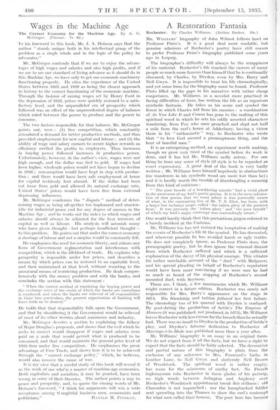Wages in the Machine Age
'IN' his foreword to this book, Mr. J. A. Hobson says that the author " stands unique both in his intellectual grasp of the problem as a single whole and in the logic of the policy he advocates."
Mr. McGregor contends that if we are to enjoy the advan- tages of high wages and salaries and also high profits, and if we are to see our standard of living advance as it should do-in this Machine Age, we have only to get our economic machinery functioning properly. He cites the experience of the United States between 1022 and 1929 as being the closest approach. In history to the correct. functioning of the economic machine. Through the fashiion of raising wages set by Henry Ford in the depression of 1922, prices were quickly restored to a satis- factory level, and the unparalleled era of prosperity which followed was an effect of the unprecedented degsee of balance Which ruled between the power to produce and the power to consume.
The two factors responsible for that balance, Mr. McGregor Points out, were : (1) free competition, which constantly stimulated a. demand for better productive methods, and thus provided employment for new capital and labour ; and (2) the ability of wage and salary earners to secure higher rewards as efficiency swelled the profits to employers. Thus increases in buying power followed increases lit productive power. Unfortunately, however, in the author's view, wages were not high enough,. and the dollar was tied to gold. if wages had been higher, wholesale prices would not have begat to decline in 1926 ; consumption would have kept in step with produc- tion ; and there would have been safe employment at home for capital recklessly, lent abroad. If' the dollar had been cut loose from gold and allowed its natural exchange rate, United States' prices would have been free from external depressing influences.
Mr. McGregor condemns the " dispute " method of deter- mining wages as being altogether too haphazard and unscien- tific for industrial' peace and for any degree of success in the Machine Age ; and he works out the index to which wages and Salaries should always be adjusted for the best interests of capital as well as labour. His analysis will astonish many who have given thought—but perhaps insufficient thought— to this problem. He points out that under the correct economy ti shortage of labour and not a surplus would be constantly felt.
He emphasizes the need for economic liberty, and abhors any form of Government regimentation and interference with competition, which is the lifeblood of trade. He explains why prosperity is impossible under low prices, and describes a means by which prices cm be restored to an equitable level, and then maintained at that level, without resorting to the unnatural means of restricting production. He deals compre- hensively with the money problem and with the banks, and concludes the section with, this statement
. " When the correct method of regulating the buying power and. the exchange rates of the credit of which the banks are custodians is employed, and when the banks are relieved of all responsibility in those• two pa•rt.iculars, the present organization of 15anking will leave little to be desired.' , He holds.that that responsibility falls upon the Government, and that by shouldering it the Government would be relieved of most of its other 'worries about commerce and industry.
Mr. McGregor devotes a section to explaining the fallacy of Major Douglas's proposals, and shows that the evil which he seeks to correct would disappear if wages and salaries were paid on a scale that would permit what is produced to be consumed, and that would maintain the general price level of 1928 firm under free competition. He emphasizes the great advantage of Free Trade, and shows how it, is to be achieved
through the " correct exchange policy," 'Which, he believes,
would also remove the cause of war.
It is my view that a careful study of this book will reveal it
as the work of one win/ is a Master of machine-age economies. Both capitalists and socialists, it may be granted, have been wrong in some of their theories. The author points a way to peace and prosperity, and, to quote the closing words of Mr. Hobson's- foreword, " I think-his arguments will win a wide acceptance among tl oughtful business men, economists and






































 Previous page
Previous page